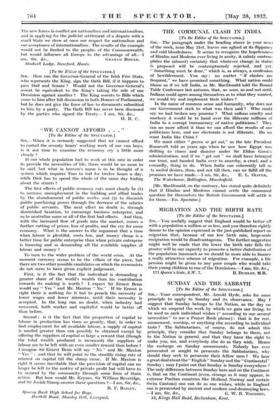THE COMMUNAL CLASH IN INDIA
[To the Editor of the SPECTATOR.]
Sim—The paragraph under the heading above in your news of the week, issue May 21st, leaves one aghast at its flippancy and cold bloodedness. It seems to recognize the hopelessness of Hindus and Moslems ever living in amity, it calmly contem- plates the (ahnost) certainty that whatever change in status is proposed will be contemptuously rejected, and yet, -" Something must be done," which is, as always, a confession of bewilderment. You say : no matter " if clashes are frequent," we have promised something. What nation could blame us if we tell India, as Mr. MacDonald told the Round Table Conference last autumn, that, as soon, as and not until, Indians could agree among themselves as to what they wanted, we would try and implement their wishes ?
In the name of common sense and humanity, why does not our Government stick to what was then said ? Who could say we had broken any promise ? What callous cruelty and mockery it would be to hand over the illiterate millions of India to a corrupt bureaucracy of native politicians ! They can no more afford it than we can afford the results of our politicians here, and our electorate is not illiterate. Do we want India like China ?
We must either "govern or gel out," as the late President Roosevelt told us years ago when he saw how Egypt was drifting to chaos and disaster under Sir Eldon Gorst's administration, and if we get out " we shall have betrayed our trust, and handed India over to anarchy, a cruel, and a cowardly, thing to do. When India can coherently tell us .ts united desires, then, and not till.then, can we fulfil all the
promises we have made.—I am, Sir, &a, E. L. OLIVER. The Waterhouse, Bollington, Macclesfield.
(Mr. MacDonald, on the contrary, has stated quite definitely that if Hindus and Moslems cannot settle the communal question for themselves the British Government will settle it for them—En. Spectator.]








































 Previous page
Previous page